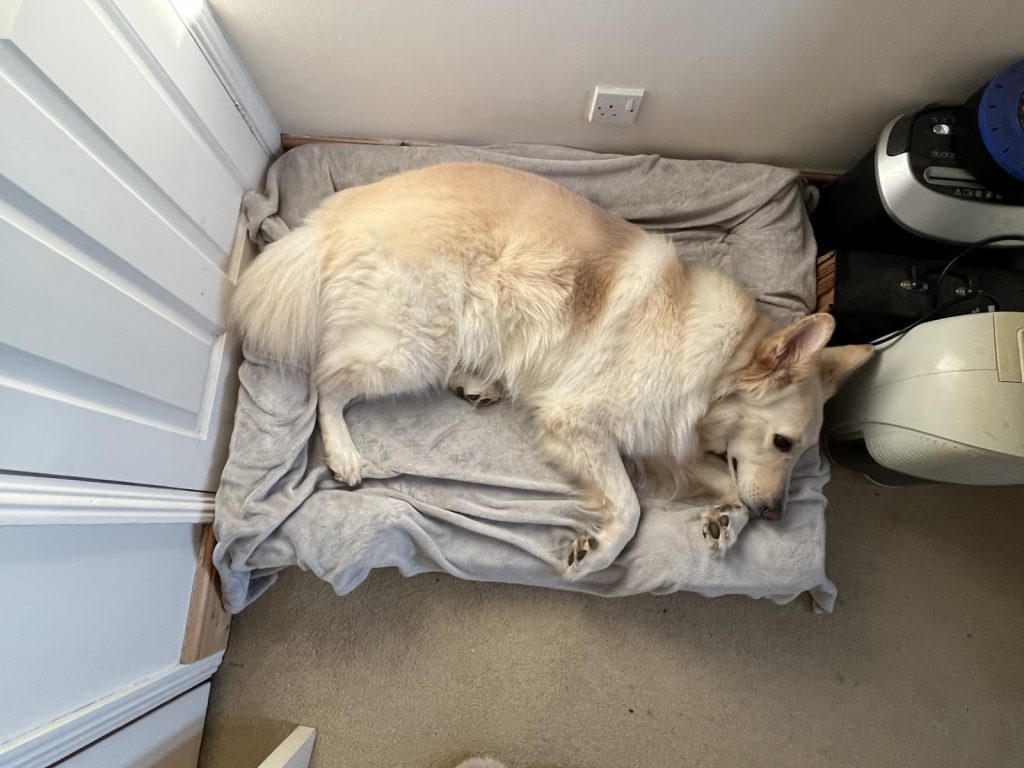Sleep is essential for all living beings, and our pets are no exception. Just like humans, dogs require quality sleep to maintain their health and well-being. One of the critical factors influencing a dog’s sleep is the bed they use. The right dog bed can significantly improve your pet’s sleep quality, thereby enhancing their overall well-being. This article explores the science behind sleep, the importance of a good dog bed, and how to choose the perfect bed for your furry friend.

Understanding Canine Sleep Patterns
Dogs, like humans, experience different stages of sleep. These stages include non-rapid eye movement (NREM) and rapid eye movement (REM) sleep. During NREM sleep, dogs undergo physical restoration, muscle repair, and immune system strengthening. REM sleep, on the other hand, is when dreaming occurs, and it’s crucial for cognitive function and memory consolidation.
Puppies and older dogs tend to sleep more than adult dogs, with puppies needing up to 20 hours of sleep per day and older dogs requiring more rest due to age-related health issues. On average, adult dogs sleep about 12-14 hours a day, often in shorter bursts rather than a continuous period like humans.
The Importance of a Good Dog Bed
A quality dog bed is more than just a comfortable place for your pet to rest. It plays a vital role in ensuring they get adequate, restorative sleep. Here are several ways a good dog bed can improve your pet’s well-being:
1. Joint and Muscle Support
As dogs age, they become more prone to joint and muscle issues such as arthritis and hip dysplasia. Orthopedic dog beds, such as Bingopaw Dog Bed made with memory foam or supportive padding, provide the necessary support to alleviate pressure on their joints and muscles. This support can reduce pain and improve mobility, leading to a better quality of life.
2. Temperature Regulation
Dogs are sensitive to temperature changes, and an appropriate bed can help regulate their body temperature. Beds with cooling gel or breathable materials can keep your dog cool in the summer, while heated beds or those with insulating materials can provide warmth during the winter. Proper temperature regulation ensures your dog remains comfortable and can sleep undisturbed.
3. Security and Comfort
Many dogs experience anxiety or stress, especially rescue dogs or those with a traumatic past. A dog bed designed to mimic the feeling of a den, with raised edges or enclosed spaces, can provide a sense of security and comfort. This secure environment can help reduce anxiety, allowing your dog to relax and sleep more soundly.
4. Hygiene and Health
A good dog bed is easy to clean and made from hypoallergenic materials, which is crucial for maintaining your dog’s health. Regular cleaning helps prevent the buildup of allergens, bacteria, and parasites that can cause skin irritations or infections. A clean, hygienic bed contributes to your dog’s overall health and well-being.
Choosing the Right Dog Bed
Selecting the right dog bed involves considering several factors, including your dog’s size, age, health, and sleeping habits. Here are some tips to help you choose the perfect bed for your pet:
1. Size and Shape
Ensure the bed is large enough for your dog to stretch out comfortably but also provides enough support when they curl up. Measure your dog from nose to tail and add a few inches to determine the appropriate bed size. The bed’s shape should also complement your dog’s sleeping style—whether they prefer to sprawl out, curl up, or lean against something.
2. Material and Filling
Different materials offer varying levels of comfort and support. Memory foam dog beds are ideal for older dogs or those with joint issues, as they conform to the dog’s body shape and provide excellent support. For dogs that like to burrow, beds with soft, plush filling might be more suitable. Consider the durability and ease of cleaning when choosing the bed material.
3. Special Features
Some dog beds come with additional features like waterproof liners, removable covers, or anti-slip bases. Waterproof liners are particularly useful for puppies or senior dogs with incontinence issues, while removable covers make cleaning easier. Anti-slip bases ensure the bed stays in place, providing stability for your dog.
4. Placement and Environment
Where you place the dog bed is also crucial. Choose a quiet, draft-free area where your dog feels safe and secure. Avoid placing the bed in high-traffic areas or near loud appliances that might disturb your dog’s sleep.

Benefits of a Good Night’s Sleep for Dogs
Just like humans, dogs reap numerous benefits from a good night’s sleep. These include:
1. Improved Physical Health
Quality sleep allows for physical restoration, muscle repair, and immune system strengthening. This is particularly important for active dogs, puppies, and older dogs. Adequate rest helps in maintaining a healthy weight, reducing the risk of obesity and related health issues.
2. Enhanced Cognitive Function
During REM sleep, dogs consolidate memories and process experiences. This is crucial for learning and training, especially for working dogs or those undergoing obedience training. A well-rested dog is more alert, responsive, and capable of learning new commands.
3. Better Mood and Behavior
Lack of sleep can lead to irritability and behavioral issues in dogs, much like in humans. A well-rested dog is generally happier, more relaxed, and less prone to anxiety or aggression. This contributes to a more harmonious relationship between you and your pet.
4. Longevity
Chronic sleep deprivation can lead to various health problems that might shorten a dog’s lifespan. Ensuring your dog gets sufficient, quality sleep can enhance their overall health and potentially increase their lifespan, allowing you to enjoy their company for longer.
Conclusion
Investing in the right dog bed is an essential aspect of responsible pet ownership. Understanding the science of sleep and recognizing the importance of a good dog bed can significantly improve your pet’s quality of life. By considering factors such as size, material, special features, and placement, you can choose a bed that meets your dog’s specific needs. Ultimately, a comfortable and supportive bed will ensure your furry friend enjoys restorative sleep, leading to better physical health, enhanced cognitive function, improved mood and behavior, and a longer, happier life.
